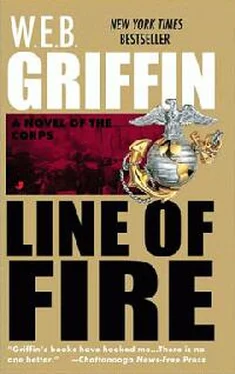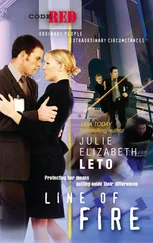W.E.B. Griffin - The Corps V - Line of Fire
Здесь есть возможность читать онлайн «W.E.B. Griffin - The Corps V - Line of Fire» весь текст электронной книги совершенно бесплатно (целиком полную версию без сокращений). В некоторых случаях можно слушать аудио, скачать через торрент в формате fb2 и присутствует краткое содержание. Жанр: prose_military, на английском языке. Описание произведения, (предисловие) а так же отзывы посетителей доступны на портале библиотеки ЛибКат.
- Название:The Corps V - Line of Fire
- Автор:
- Жанр:
- Год:неизвестен
- ISBN:нет данных
- Рейтинг книги:4 / 5. Голосов: 1
-
Избранное:Добавить в избранное
- Отзывы:
-
Ваша оценка:
- 80
- 1
- 2
- 3
- 4
- 5
The Corps V - Line of Fire: краткое содержание, описание и аннотация
Предлагаем к чтению аннотацию, описание, краткое содержание или предисловие (зависит от того, что написал сам автор книги «The Corps V - Line of Fire»). Если вы не нашли необходимую информацию о книге — напишите в комментариях, мы постараемся отыскать её.
The Corps V - Line of Fire — читать онлайн бесплатно полную книгу (весь текст) целиком
Ниже представлен текст книги, разбитый по страницам. Система сохранения места последней прочитанной страницы, позволяет с удобством читать онлайн бесплатно книгу «The Corps V - Line of Fire», без необходимости каждый раз заново искать на чём Вы остановились. Поставьте закладку, и сможете в любой момент перейти на страницу, на которой закончили чтение.
Интервал:
Закладка:
"Getting it ashore in rubber boats is going to be a bitch, too.
The shallow slope of the beach results in pretty heavy surf under most conditions. We won't know what those conditions are until we get there."
"We?" Sergeant George Hart thought, somewhat unkindly.
What's this we crap? We're not going. These guys are going.
"At that time-when the Pelican surfaces-a decision will have to be made," Banning went on, "whether to try to land the entire team and all the equipment. If the surf or other conditions make that too risky, then we'll put just Chief Wallace and three other men ashore.
"That decision will be made by Lieutenant McCoy. Lieutenant McCoy's something of an expert on rubber-boat landings.
The last one he made was on Makin Island with the Marine Raiders." Heads turned to look at Lieutenant K. R. McCoy.
That was probably necessary, George Hart decided, to impress these people. But McCoy sure didn't like it.
"If it turns out we can only put four men ashore safely, two will immediately start out for Ferdinand Six. Two will remain on the beach. The two on the beach will have two missions. The first is to conduct tests of the beach, to see if the sand there will support the weight of an airplane. That information will be sent to the submarine and then relayed here. After that the submarine will immediately depart the area; it will return the following day. Their second mission will be to tell the submarine, after its return, whether or not it is safe to land the full team.
"Repeated attempts to land the replacement team and its equipment will be made until they are successful or the tests have indicated that the beach will take an aircraft.
"If that proves to be the case, then the aircraft will land there with the second replacement team and its equipment. That will of course solve both the insertion and extraction problems, since the aircraft will take the present team out with it, as well as the two people we insert onto the beach.
"The problem-at least in my judgment-is that the aircraft plan is not likely to work. If it doesn't, then the insertion of the replacement team and the extraction of the people now operating Ferdinand Six will be by submarine."
He looked around the room. "OK, questions?"
"Do I understand, Sir," a young Australian Sub-Lieutenant asked, "that I would be inserted regardless of surf conditions?"
"No," Lieutenant Commander Eric Feldt answered for Banning. "We will land either the entire team or none of it. Except, of course, for Chief Wallace."
"Yes, Sir."
"Question, Sir?" a buck sergeant of USMC Special Detachment 14 asked.
"Shoot."
"In case of bad surf conditions, no radios will go ashore, right?"
"Right. I just said that. The whole team goes in or none of it."
"How will the two people onshore communicate with the sub?"
"The Navy-our Navy," Lieutenant McCoy answered, "has a portable, battery-powered radio. A voice radio. Two of them are being flown in here. It has enough range to reach from the beach to the sub. And about two hours' battery life. If we can't land the whole team, I'll take one of them and a spare set of batteries with me in the rubber boat."
"Yes, Sir. But what about the airplane?"
"What about the airplane?"
"How are you going to communicate with it?"
"Shit!" Lieutenant McCoy said furiously.
"I mean, Sir, if we get it."
"I know what you mean," McCoy said. "Goddamn it, I didn't think about that!"
"Lieutenant," Chief Signalman Nathaniel Wallace, Royal Australian Navy Volunteer Reserve, asked, pronouncing it Lef-tenant, "I think we could probably modify the Navy radio so it would net with the aircraft radios. When did you say they are coming?"
"As soon as they can fly them in. Probably today," McCoy replied.
"I may be wrong, of course, but those types of short-range radios often radiate in the same general area of the frequency spectrum as aircraft radios. I rather suspect that we could make it work."
"Jesus Christ, I hope so."
Chief Signalman Wallace was the ugliest single human being Sergeant George Hart, USMC, could ever remember seeing.
He was also the only Navy man he had ever seen wearing a skirt.
But it wasn't possible to dismiss him as some quaint and ignorant savage out of the pages of National Geographic magazine. Hart had already long since realized that his bushy head of hair and blue-black teeth, his scars and tattoos, were not all of him. On the other side of all that was a mind at least as sharp as his own.
For one thing, Nathaniel spoke fluent English-English English, like the announcers on the British Broadcasting Corporation's International Service. For another, of the dozen or more radio technicians (including three Marines) who ran the Coastwatcher Establishment's radio station, he probably knew the most about radios, inside and out.
Above the waist, Chief Wallace wore the prescribed uniform for Chief Petty Officers of the RAN. Just as in the American Navy, the senior enlisted rank of the RAN wore officer-type uniforms: Instead of the traditional bell-bottom trousers and a blouse with a black kerchief and flap hanging down the back, they wore a double-breasted business suit with brass buttons, and a shirt and tie. And instead of those cute little sailor hats (as George and most other Marines thought of them), Chief Petty Officers wore brimmed caps with a special Chief Petty Officer insignia pinned on them.
The white crown of Chief Wallace's brimmed cap was not quite as wide as the mass of black, crinkly hair it rode on. It was centered with almost mathematical precision at least three inches over his skull. A neatly tied black necktie was pulled with precision into the collar of his immaculate white shirt. The brass buttons of his jacket glistened, as did his black Oxford shoes. Between the jacket and the shoes he wore a skirt, of blue denim, and knee-high immaculate white stockings. This served to expose incredibly ugly knees and skinny upper legs matted with crinkly hair.
"If we can't get the radio to communicate with the aircraft, McCoy, we could work out some sort of landing panel signals," Banning said.
"With respect, Sir," Chief Signalman Wallace said, "I don't think it will be a problem."
"Any other questions?" Major Banning asked.
"What are these beach tests, Sir?" a USMC Special Detachment 14 corporal asked.
"As I understand it," Major Banning said, "Sergeant Hart has a steel cone he pounds into the sand with a ten-pound weight. He then reads the markings on the cone. The theory is that it can be determined how much weight the sand will support."
"Yes, Sir."
"I'll say it again. Don't count on the airplane."
"Yes, Sir."
What that sonofabitch just said, Sergeant George Hart realized in shock, was that I'm going to be in one of those rubber boats!
[Six]
HEADQUARTERS, MAG-25
ESPIRITU SANTO
0730 HOURS 2 OCTOBER 1942
"Come on in, Jack," Lieutenant Colonel Stanley N. Holliman, USMC, Executive Officer of MAG-25, said, waving his hand at Major Jack Finch, USMC.
Major Finch entered the office. He was wearing a wash-faded Suit, Flying, Cotton, Tropical Areas, and he was armed with a.45 Colt automatic in a shoulder holster.
"Stan, I was on the threshold-" he began to complain, and then stopped. There was a stranger in Holliman's office, a non-aviator Marine in a rear-echelon uniform. "Good morning, Sir. You wished to see me?"
"This won't take long," Colonel Holliman said. "Dillon, this is Major Jack Finch. Jack, this is Major Homer Dillon."
"People call me Jake," Dillon said, putting out his hand.
"I think we'd save some time, Dillon," Holliman said, "if you would show Finch what you showed me." Dillon took a stiff piece of plastic from the right bellows pocket of his jacket and extended it to Finch. He read it and then looked at Colonel Holliman.
Читать дальшеИнтервал:
Закладка:
Похожие книги на «The Corps V - Line of Fire»
Представляем Вашему вниманию похожие книги на «The Corps V - Line of Fire» списком для выбора. Мы отобрали схожую по названию и смыслу литературу в надежде предоставить читателям больше вариантов отыскать новые, интересные, ещё непрочитанные произведения.
Обсуждение, отзывы о книге «The Corps V - Line of Fire» и просто собственные мнения читателей. Оставьте ваши комментарии, напишите, что Вы думаете о произведении, его смысле или главных героях. Укажите что конкретно понравилось, а что нет, и почему Вы так считаете.









